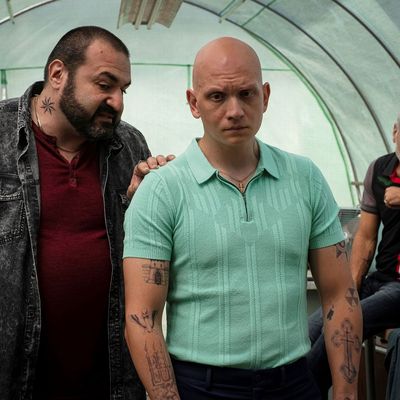
Is redemption possible for a hit man? Is there a way out for someone who only feels real purpose when they’re hurting another person? And even if you, the hit man, do find some other escape — something that can fill the prominent role that violence has always played in your life — is there any way to forget all those dead bodies? Is there a way to make peace with the pain you’ve caused while being fully aware that all those bodies belonged to real people, people who had families? How do you forgive yourself when you know that there are so many people in the world who will never forgive you?
The woman whose story we see in the first scene of “All the Sauces” (played by Annabeth Gish) is one of the people who will never forgive Barry Berkman, even if she didn’t know his name until now. She’s never had clarity about who killed the husband she loved, and that lack of closure has aged her decades in the short time since it happened. Enter Fuches, fresh off his epiphany that the best recruits for a revenge army are, well, other people who want revenge on the same guy. It’s not just the widow; it’s her son Kyle, whom Fuches simply tells, “I know who killed your dad.” By the end of the episode, Kyle and his mom have bought a Glock, apparently ready to seek justice outside of the legal system.
They’re not the only ones Fuches manipulates. He seems to be going on a recruitment tour as his PI alter ego Kenneth Goulet, starting with the family of the man Barry killed at the very beginning of the series, followed by the father of Ryan, whom Barry was initially hired to kill in the pilot.
The story reminds me of a BoJack Horseman episode, of all things: the final-season installment “A Quick One, While He’s Away,” which eschews the main cast entirely to focus on the people who remain traumatized or struggling in their professional lives after their encounters with BoJack. By that point in the show, BoJack had become a better person, to a degree — still imperfect, but undoubtedly less selfish and unaware. But focusing on the victims of his past self was a necessary reminder that growth doesn’t undo all harm. It may be easy to root for a reformed anti-hero, a violent man who, with time, works toward a place where he can grow and feel remorse and eventually forgive himself. But what about the people who remain, the forgotten people, who are still hurting?
Sally is hurting. She may not have consciously realized it at first, but it becomes obvious when she experiences the best night of her entire life and the man who’s supposed to be there with her isn’t there. For all of Sally’s unpleasant qualities, it’s genuinely nice to see her get a real win at the Joplin premiere; Sarah Goldberg is great in the red-carpet scene, every twitch on her face conveying how surreal this all is for Sally. As the score swells, she banters nervously but comfortably with the journalists, taking mental pictures when she gets a moment to herself. Tomorrow will be another day, but in this moment, life is the best it’s ever been.
It’s a lot for Sally to process — and it’s not over. The night (the episode?) reaches its peak during Sally’s big speech, when she interrupts the monologue she prepared to share the news that Joplin got a 98 on Rotten Tomatoes. The impassioned applause in reaction to a Rotten Tomatoes score is cynically funny (“98? Wow! 90-fucking-8!”), but it’s easy to understand why someone like Sally would be overwhelmed. The series of emotions that crosses her face when she breaks down crying onstage is something to behold: panic, gratitude, delirium, fear, and most of all, joy. It’s a little awkward and a little funny and a little emotional. It’s Goldberg at her best.
But minutes later, Sally is yanked back to reality. In the end it’s Katie, of course, who finally gets through to her about her violent boyfriend. A premiere doesn’t seem like the ideal time to broach such a serious topic, especially when Sally is riding such a high, but that’s exactly what makes it the most effective time. Katie is so moved by Sally’s speech, so full of love for her boss and friend and disturbed by her Barry blinders, that she can’t stand the idea of her going home to someone who might hurt her.
It’s the final push Sally needed to realize how poorly Barry treated her in the office the other day, to realize how much that confrontation affected her. She breaks up with him when he finally shows up after the night is over, telling him to move out. I’m sure this relationship isn’t over for good, but Sally ends the episode in an unquestionably better place than she started it.
The real reason Barry didn’t show, of course, is that he was busy wiping out Fernando and his soldiers with a dysfunctional bomb. (The Detonate app sometimes has Bluetooth connectivity issues, naturally.) When the hit takes too long, it leads to Cristobal almost getting killed, too — in a supremely tense scene, he arrives home only to be confronted by Fernando, who sensed his disloyalty and sniffed out his relationship with NoHo Hank. He presents his son-in-law with a simple ultimatum: kill his boyfriend or die. Luckily, the bomb goes off just late enough that Cristobal makes it out alive, and Barry decides to deliver him safely to Hank rather than eliminate all witnesses the way he typically would. It’s that act of mercy, and the grateful thanks he gets from Hank because of it, that contributes to Barry’s final perspective shift of the episode.
At the beginning of this season, Hank said that forgiveness had to be earned. With Barry saving the man Hank loves, he’s secured that forgiveness; can he do the same for some of the other people he hurt? Before he gets dumped, Barry does have the self-awareness to understand that when it comes to Gene Cousineau, he can’t force forgiveness. At this point, all he can really offer is an apology for the whole hostage thing, and the promise to leave Gene and his family alone — along with a duffel bag full of money from the Fernando job to more peacefully ensure his silence. For someone who has been desperately preparing to leave Los Angeles the whole episode, it’s the assurance he needs to stay.
Of course, all of this is too little, too late. And I don’t truly believe that Barry Berkman will be different from now on just because “All the Sauces” climaxes with two relatively merciful acts. Barry has repeatedly shown an inability to keep his hands clean, and I don’t expect that to change. Still, it’s worth considering: If Barry does want to genuinely atone for what he’s done, what does that look like? Too often in these stories, jail time and death are the only answers, but Barry always has more on its mind.
Barry, as a character, occupies a fundamentally different role in the narrative now from two seasons ago, or even a few episodes ago. For most of season three, our anti-hero has become the villain: screaming at his girlfriend, kidnapping and threatening his mentor, and killing more than ever. But what’s interesting about Barry is that it never stops subverting our understanding of this man, somebody we might actively loathe by now. (It reminds me of You, actually, in that way — both shows are doing Dexter better than Dexter did after its first four seasons.) Season two saw Barry quitting his violent lifestyle entirely and failing, giving in to his impulses at his most vulnerable and angry. Now he’s been through hell again, and he seems ready for a more lasting form of change.
“All the Sauces” may not be the best episode of Barry’s third season; much of it is spent setting up future stories, as when Gene gets offered additional scenes on Laws of Humanity and even receives a dinner invite from Joe Mantegna, who wants to bury the hatchet after reading about what Gene did for a veteran. But I’m fascinated by the continual deepening and complication of our protagonist, and I understand better now how the series can extend for another season or two after this one.
What’s critical to the continued success of Barry is that the show remains painfully aware of how far Barry is from true redemption. That’s encapsulated nicely by this episode’s glimpse into the lives of his victims’ families, people we rarely think about who are still out there living their lives and grieving. It’s clear that if the question is “What if Barry really did become a good person now?,” the answer is that it still wouldn’t be enough. It’s never been enough.
Bullet Points
• I can’t believe I didn’t have space to talk about the great Fred Melamed’s guest appearance as Gene’s agent Tom. His long recitation of the insults he’s heard about Gene is the comedic highlight of an already funny episode. It finally ends when Gene takes issue with Rob Reiner calling him “fuck-fuck” after his Ghosts of Mississippi audition in 1994. “I specifically said I don’t want feedback,” Tom says.
• Another great Melamed line reading: “This is the industry-wide amnesia we’ve been hoping for for so long!”
• Sally: “Oh my God, they’re playing me off. I didn’t think they did that at premieres!”
• I can’t tell from my screener who voices Faye in Detonate customer support, but she gives a great comedic performance just by speaking like a normal friendly customer-service rep. I love the sequence when Barry turns off the Wi-Fi, the bomb goes off, and she chimes in, “Well, sounds like we were successful. Is there anything else I can help you with today?”
Update: An earlier version of this recap read that Barry killed Ryan in the pilot (he didn’t). It has been corrected.


